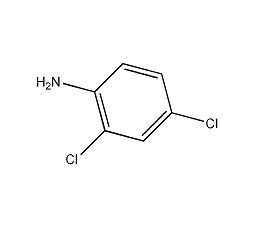
Structural formula
| Business number | 05Q0 |
|---|---|
| Molecular formula | C6H5NCL2 |
| Molecular weight | 162.02 |
| label |
2,4-Dichloro, 2,4-Dichloro-anilin, 2,4-Dichloro-benzenamin, Amines |
Numbering system
CAS number:554-00-7
MDL number:MFCD00007661
EINECS number:209-057-8
RTECS number:BX2600000
BRN number:386422
PubChem number:24861967
Physical property data
1. Character: white crystal[1]
2. Melting point (℃): 59~62[2]
3. Boiling point (℃): 245[3]
4. Relative density (water=1): 1.57[4]
5. Octanol/water partition coefficient: 2.78[5]
6. Solubility: slightly soluble in water, soluble in ethanol and ether. [6]
Toxicological data
1. Acute toxicity[7] LD50: 1600mg/kg (rat oral)
2. Irritation No data available
3. Subacute and chronic toxicity[8]
Rat exposure to 2,4-dichloroaniline at a daily dose of 20 mg/kg can cause methemoglobinemia, liver damage, conditioned reflex activity impairment, and immune reactivity. decrease, and lactate dehydrogenase activity in the blood increases.
Ecological data
1. Ecotoxicity[9] LC50: 11.7ppm (14d) (guppy)
2. Biodegradability No data yet
3. Non-biodegradability[10] In the air, when the hydroxyl radical concentration is 5.00×105/cm3, the degradation half-life is 42h (theoretical).
4. Bioaccumulation[11] BCF: 94.7 (zebrafish)
Molecular structure data
1. Molar refractive index: 40.27
2. Molar volume (cm3/mol): 115.6
3. Isotonic specific volume (90.2K ): 304.8
4. Surface tension (dyne/cm): 48.3
5. Polarizability (10-24cm3): 15.96
Compute chemical data
1. Reference value for hydrophobic parameter calculation (XlogP): None
2. Number of hydrogen bond donors: 1
3. Number of hydrogen bond acceptors: 1
4. Number of rotatable chemical bonds: 0
5. Number of tautomers: none
6. Topological molecule polar surface area 26
7. Number of heavy atoms: 9
8. Surface charge: 0
9. Complexity: 97.1
10. Number of isotope atoms: 0
11. Determine the number of atomic stereocenters: 0
12. Uncertain number of atomic stereocenters: 0
13. Determine the number of chemical bond stereocenters: 0
14. Number of uncertain chemical bond stereocenters: 0
15. Number of covalent bond units: 1
Properties and stability
1. Stability[12] Stable
2. Incompatible substances [13] Acids, acid chlorides, acid anhydrides, strong oxidants
3. Conditions to avoid contact [14] Heating
4. Polymerization hazard[15] No polymerization
5. Decomposition products[16] Hydrogen chloride
Storage method
Storage Precautions[17] Stored in a cool, ventilated warehouse. Keep away from fire and heat sources. The packaging is sealed. They should be stored separately from oxidants, acids, and food chemicals, and avoid mixed storage. Equipped with the appropriate variety and quantity of fire equipment. Suitable materials should be available in the storage area to contain spills.
Synthesis method
Chlorination of acetanilide with bleaching powder, then hydrolysis under acidic conditions, and purification to obtain 2,4-dichloroaniline.
Purpose
Used as dye intermediate. [18]

 微信扫一扫打赏
微信扫一扫打赏

